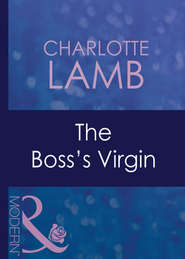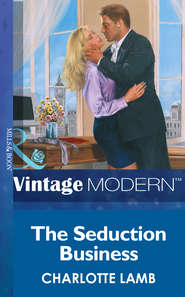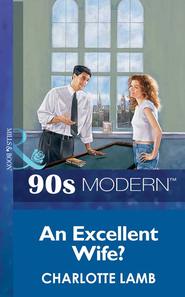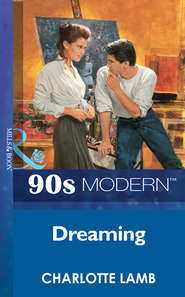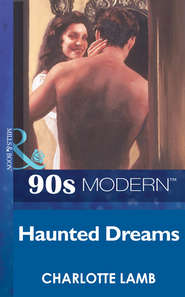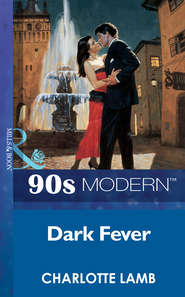По всем вопросам обращайтесь на: info@litportal.ru
(©) 2003-2025.
✖
Guilty Love
Автор
Год написания книги
2018
Настройки чтения
Размер шрифта
Высота строк
Поля
Guilty Love
CHARLOTTE LAMB
Nowhere to RunLinzi York loved her husband - but Barty had changed. His rage and growing despair since the accident had taken a brutal toll. Linzi was trapped in a nightmare. And Ritchie Calhoun knew it. Linzi and Ritchie's relationship had always remained on a cool professional level - but now facades were beginning to crumble.Needs and desires they were powerless to deny tormented them… and it was Linzi who was paying the highest price. Then a horrible tragedy shattered their lives - and Ritchie's courage proved his love in a way that few men ever could… .
Guilty Love
Charlotte Lamb
www.millsandboon.co.uk (http://www.millsandboon.co.uk)
CONTENTS
CHAPTER ONE (#u3aa08d07-f79f-50f2-abd1-734fa769f1e2)
CHAPTER TWO (#u22281640-1a91-5ec6-92d6-e543e1a905b4)
CHAPTER THREE (#litres_trial_promo)
CHAPTER FOUR (#litres_trial_promo)
CHAPTER FIVE (#litres_trial_promo)
CHAPTER SIX (#litres_trial_promo)
CHAPTER SEVEN (#litres_trial_promo)
CHAPTER EIGHT (#litres_trial_promo)
CHAPTER NINE (#litres_trial_promo)
CHAPTER ONE
‘I‘M AFRAID I have to ask you to work late again tonight, Mrs York.’
Linzi had been so intent on her work that she hadn’t noticed her boss walk into her office, and his deep voice made her jump.
As she looked round at him, her fine silvery hair flicking back from her face, Ritchie Calhoun gave her one of his slow, sardonic smiles. ‘Your nerves are in a bad way! I didn’t mean to frighten you out of your wits!’
She gave him a wry look. Every time he came into a room he made her jump; he made most of the staff jump. He was that sort of man. Even now she knew him quite well she was never able to relax when he was around. The air seemed to crackle with electricity everywhere he went, he was curt and incisive, and those grey eyes seemed to see right through to the backbone, which was disconcerting. But she could hardly tell him any of that, so she simply said, ‘I’m sorry, I was miles away—what did you say, Mr Calhoun?’
‘I want you to work late tonight,’ he repeated, and Linzi’s teeth caught her lower lip, worrying it. Ritchie Calhoun watched the betraying little movement, his eyes shrewd. ‘Is that a problem?’
It was always a problem when he wanted her to work late because it upset Barty every time, but when she’d accepted the job Ritchie Calhoun had laid it on the line that she would have to be prepared to work flexible hours, rather than just nine to five, so how could she complain now? After all, he, himself, worked ferociously hard, putting in a twelve-hour day most days. He was usually there when she arrived in the morning and there when she left, unless he was away on some business trip, or working out in the field with one of his construction teams on a difficult project, when, she gathered, he worked even harder for longer hours. It was said that hardbitten construction workers had been known to turn pale at the sight of him bearing down on them if they weren’t working hard enough, or had made some stupid mistake. Everyone in the firm admired the man, but they all agreed—it was no easy job working for Ritchie Calhoun.
The good side was that she had plenty of free time on days when he didn’t need her and she was earning a lot more money than she ever had before. She and Barty were getting used to having that extra money every month. They had bought new furniture, new linen, curtains, a new dinner set—gradually their little flat was beginning to look the way Linzi wanted it to look and she could never earn this much anywhere else.
That was why Barty didn’t force her to give up the job, much as he resented the hours she had to work.
So Linzi shook her head, suppressing a sigh. ‘No, no problem. I can work tonight—do you have any idea when I shall get away, though? I have to cook my husband’s dinner.’
‘Isn’t it time he learnt to cook his own?’ Ritchie Calhoun drily enquired, his hard mouth twisting. ‘Or he could pick up a Chinese takeaway on his way home from work.’
Involuntarily, Linzi laughed at the idea. ‘Barty isn’t keen on takeaway food, he likes home cooking.’ He liked to find her waiting for him when he came home, too, and, if he didn’t he sometimes went out again, to a bar to drink his supper. Her laughter died; sadness filled her eyes.
Ritchie Calhoun lounged against her desk, watching her changing expressions. She had a mobile face which gave away too much of what was going on inside her. Her features were delicate: a small, finely moulded nose, high cheekbones, wide eyes the colour of the sea on a sunny day, a soft pink mouth which was generously full and yet sensitive, suggesting to Ritchie a sensual nature you would never suspect from anything else about Linzi York, he thought, eyes narrowing. Linzi looked up and caught him staring, and blushed as if picking up on his secret thoughts.
‘And I suppose you do all the housework, too, and wash and iron his clothes for him?’ he asked with a faint sarcasm that indicated disapproval.
‘It’s what Barty’s used to; his mother always did those things for him,’ she began, then stopped, frowning, angry with herself for sounding as if she was apologising for her husband. Her private life was none of Ritchie Calhoun’s business for one thing, and, for another, she loved Barty—it made her happy to take care of him.
‘You both work full-time, though,’ Ritchie Calhoun pointed out.
‘Yes, well...Barty wasn’t brought up to look after himself,’ she defensively said. ‘He was an only child, his mother was middle-aged when he was born, and so thrilled to have a child of her own that I’m afraid she waited on him hand and foot. It made her happy to spoil him.’
‘And you’ve gone on spoiling him?’
She didn’t answer that; he saw the flicker of resentment in her face, and her lids came down like shutters over her eyes, to hide her thoughts from him. Ritchie picked up on them all the same: obviously she wasn’t happy with all these questions, with the implied criticism of her husband; and of course she had every reason to feel that way. He had no right to interfere or even comment. Their marriage was their business. If she wanted to make a doormat of herself, why should he stop her? Doormats were useful—as he had often found. His mouth twitched with sudden amusement, yet he didn’t change the subject. He could never help trying to improve whatever he found and did not approve of.
‘Does his mother live near by? Couldn’t he have dinner with her?’ he suggested, always looking for the practical solution to a problem. That was what made him so good at his business: he knew how to make things work, machinery, money, people.
‘His mother’s dead,’ Linzi said gravely.
Ritchie sobered, pushing back his thick, dark hair with an impatient hand. ‘Oh. Sorry to hear that. I’ve lost both my parents; I know what a gap that makes. Having a family gives you your own support system, doesn’t it? Well, then, couldn’t he take his father out to dinner?’
‘His father died when Barty was a boy.’ There was that look of sadness about her again. It turned her blue eyes a strange colour, like slate in the rain, thought Ritchie Calhoun, observing the phenomenon closely. She was endlessly fascinating to watch: never the same two minutes running. Lately he had found himself watching her all the time, and he frowned suddenly, the admission taking him by surprise. He had spent years trying to stop his secretaries getting too interested in him; it would be stupid to fall into the same trap himself.
Yet he was still curious enough to ask, ‘When did his mother die?’ He moved away from her slightly, however; settled himself on the edge of her desk, his lean body at ease, the long legs crossed and his foot swinging.
‘Two years ago.’ Linzi was rather perplexed—why was he so interested in Barty’s family? She had got used to Ritchie Calhoun’s offhand manner at work, his drive and sarcasm. She had never seen him in a mood like this.
‘So he has no family now, except you?’ Ritchie thought aloud slowly, his eyes thoughtful. Was that why she had gone on spoiling her husband, to comfort him, make up for the loss of his mother?
‘No,’ she said, her voice low and husky. ‘He has nobody but me.’
There was something touching about the way she said it. She had only been working for him for six months and they had never exchanged any personal confidences before. He didn’t know why he was asking questions about her private life now; indeed, one part of him protested about the wisdom of showing so much interest in her. Yet he kept on watching her, his grey eyes glimmering, brilliant with curiosity. What was she thinking? What did that look in her eyes mean?
There was something faintly childlike about her, with her long, straight silvery hair and those wide, large-pupilled blue eyes, yet he had begun to sense that there were secrets buried behind her open gaze, and his curiosity, once aroused, wasn’t easy to smother. Most of the women he met were so obvious, such simple equations; they didn’t hold his interest longer than it took for him to find out what lay behind their smooth, glossy façdes.
At first sight he had thought Linzi York was even simpler than usual; she was as calm as milk, as ordinary as bread and butter. It had taken him months to find out his mistake, and even now he didn’t really have a clue what she was hiding, only that she was hiding something.
Ritchie Calhoun was determined to get to the bottom of her mystery, however long it took.
‘How long have you been married?’ he lazily enquired, and she gave him a faintly exasperated glance.
‘Four years, ten months.’
It was Ritchie’s turn to be startled. ‘I’d no idea you’d been married that long!’ She didn’t look old enough. ‘I assumed you had just got married when you joined us.’ He remembered their first interview suddenly, with a faint surprise because he saw her differently now.
It had been a cold November morning. She had been wearing a carnation-pink dress and had glowed with warmth in the grey light, yet she had seemed so young. All the same, she had had impressive office skills, good references from her last boss, who had only parted with her because he was moving his firm to another part of the country, and, most important of all, she was married. Ritchie’s previous secretary had fallen in love with him, without any encouragement, and had made his life impossible with jealous scenes and weeping in the office. He had had to fire her; it made him shudder just to remember that scene and he hadn’t wanted it to happen again, so he had only short-listed married applicants for the job.
CHARLOTTE LAMB
Nowhere to RunLinzi York loved her husband - but Barty had changed. His rage and growing despair since the accident had taken a brutal toll. Linzi was trapped in a nightmare. And Ritchie Calhoun knew it. Linzi and Ritchie's relationship had always remained on a cool professional level - but now facades were beginning to crumble.Needs and desires they were powerless to deny tormented them… and it was Linzi who was paying the highest price. Then a horrible tragedy shattered their lives - and Ritchie's courage proved his love in a way that few men ever could… .
Guilty Love
Charlotte Lamb
www.millsandboon.co.uk (http://www.millsandboon.co.uk)
CONTENTS
CHAPTER ONE (#u3aa08d07-f79f-50f2-abd1-734fa769f1e2)
CHAPTER TWO (#u22281640-1a91-5ec6-92d6-e543e1a905b4)
CHAPTER THREE (#litres_trial_promo)
CHAPTER FOUR (#litres_trial_promo)
CHAPTER FIVE (#litres_trial_promo)
CHAPTER SIX (#litres_trial_promo)
CHAPTER SEVEN (#litres_trial_promo)
CHAPTER EIGHT (#litres_trial_promo)
CHAPTER NINE (#litres_trial_promo)
CHAPTER ONE
‘I‘M AFRAID I have to ask you to work late again tonight, Mrs York.’
Linzi had been so intent on her work that she hadn’t noticed her boss walk into her office, and his deep voice made her jump.
As she looked round at him, her fine silvery hair flicking back from her face, Ritchie Calhoun gave her one of his slow, sardonic smiles. ‘Your nerves are in a bad way! I didn’t mean to frighten you out of your wits!’
She gave him a wry look. Every time he came into a room he made her jump; he made most of the staff jump. He was that sort of man. Even now she knew him quite well she was never able to relax when he was around. The air seemed to crackle with electricity everywhere he went, he was curt and incisive, and those grey eyes seemed to see right through to the backbone, which was disconcerting. But she could hardly tell him any of that, so she simply said, ‘I’m sorry, I was miles away—what did you say, Mr Calhoun?’
‘I want you to work late tonight,’ he repeated, and Linzi’s teeth caught her lower lip, worrying it. Ritchie Calhoun watched the betraying little movement, his eyes shrewd. ‘Is that a problem?’
It was always a problem when he wanted her to work late because it upset Barty every time, but when she’d accepted the job Ritchie Calhoun had laid it on the line that she would have to be prepared to work flexible hours, rather than just nine to five, so how could she complain now? After all, he, himself, worked ferociously hard, putting in a twelve-hour day most days. He was usually there when she arrived in the morning and there when she left, unless he was away on some business trip, or working out in the field with one of his construction teams on a difficult project, when, she gathered, he worked even harder for longer hours. It was said that hardbitten construction workers had been known to turn pale at the sight of him bearing down on them if they weren’t working hard enough, or had made some stupid mistake. Everyone in the firm admired the man, but they all agreed—it was no easy job working for Ritchie Calhoun.
The good side was that she had plenty of free time on days when he didn’t need her and she was earning a lot more money than she ever had before. She and Barty were getting used to having that extra money every month. They had bought new furniture, new linen, curtains, a new dinner set—gradually their little flat was beginning to look the way Linzi wanted it to look and she could never earn this much anywhere else.
That was why Barty didn’t force her to give up the job, much as he resented the hours she had to work.
So Linzi shook her head, suppressing a sigh. ‘No, no problem. I can work tonight—do you have any idea when I shall get away, though? I have to cook my husband’s dinner.’
‘Isn’t it time he learnt to cook his own?’ Ritchie Calhoun drily enquired, his hard mouth twisting. ‘Or he could pick up a Chinese takeaway on his way home from work.’
Involuntarily, Linzi laughed at the idea. ‘Barty isn’t keen on takeaway food, he likes home cooking.’ He liked to find her waiting for him when he came home, too, and, if he didn’t he sometimes went out again, to a bar to drink his supper. Her laughter died; sadness filled her eyes.
Ritchie Calhoun lounged against her desk, watching her changing expressions. She had a mobile face which gave away too much of what was going on inside her. Her features were delicate: a small, finely moulded nose, high cheekbones, wide eyes the colour of the sea on a sunny day, a soft pink mouth which was generously full and yet sensitive, suggesting to Ritchie a sensual nature you would never suspect from anything else about Linzi York, he thought, eyes narrowing. Linzi looked up and caught him staring, and blushed as if picking up on his secret thoughts.
‘And I suppose you do all the housework, too, and wash and iron his clothes for him?’ he asked with a faint sarcasm that indicated disapproval.
‘It’s what Barty’s used to; his mother always did those things for him,’ she began, then stopped, frowning, angry with herself for sounding as if she was apologising for her husband. Her private life was none of Ritchie Calhoun’s business for one thing, and, for another, she loved Barty—it made her happy to take care of him.
‘You both work full-time, though,’ Ritchie Calhoun pointed out.
‘Yes, well...Barty wasn’t brought up to look after himself,’ she defensively said. ‘He was an only child, his mother was middle-aged when he was born, and so thrilled to have a child of her own that I’m afraid she waited on him hand and foot. It made her happy to spoil him.’
‘And you’ve gone on spoiling him?’
She didn’t answer that; he saw the flicker of resentment in her face, and her lids came down like shutters over her eyes, to hide her thoughts from him. Ritchie picked up on them all the same: obviously she wasn’t happy with all these questions, with the implied criticism of her husband; and of course she had every reason to feel that way. He had no right to interfere or even comment. Their marriage was their business. If she wanted to make a doormat of herself, why should he stop her? Doormats were useful—as he had often found. His mouth twitched with sudden amusement, yet he didn’t change the subject. He could never help trying to improve whatever he found and did not approve of.
‘Does his mother live near by? Couldn’t he have dinner with her?’ he suggested, always looking for the practical solution to a problem. That was what made him so good at his business: he knew how to make things work, machinery, money, people.
‘His mother’s dead,’ Linzi said gravely.
Ritchie sobered, pushing back his thick, dark hair with an impatient hand. ‘Oh. Sorry to hear that. I’ve lost both my parents; I know what a gap that makes. Having a family gives you your own support system, doesn’t it? Well, then, couldn’t he take his father out to dinner?’
‘His father died when Barty was a boy.’ There was that look of sadness about her again. It turned her blue eyes a strange colour, like slate in the rain, thought Ritchie Calhoun, observing the phenomenon closely. She was endlessly fascinating to watch: never the same two minutes running. Lately he had found himself watching her all the time, and he frowned suddenly, the admission taking him by surprise. He had spent years trying to stop his secretaries getting too interested in him; it would be stupid to fall into the same trap himself.
Yet he was still curious enough to ask, ‘When did his mother die?’ He moved away from her slightly, however; settled himself on the edge of her desk, his lean body at ease, the long legs crossed and his foot swinging.
‘Two years ago.’ Linzi was rather perplexed—why was he so interested in Barty’s family? She had got used to Ritchie Calhoun’s offhand manner at work, his drive and sarcasm. She had never seen him in a mood like this.
‘So he has no family now, except you?’ Ritchie thought aloud slowly, his eyes thoughtful. Was that why she had gone on spoiling her husband, to comfort him, make up for the loss of his mother?
‘No,’ she said, her voice low and husky. ‘He has nobody but me.’
There was something touching about the way she said it. She had only been working for him for six months and they had never exchanged any personal confidences before. He didn’t know why he was asking questions about her private life now; indeed, one part of him protested about the wisdom of showing so much interest in her. Yet he kept on watching her, his grey eyes glimmering, brilliant with curiosity. What was she thinking? What did that look in her eyes mean?
There was something faintly childlike about her, with her long, straight silvery hair and those wide, large-pupilled blue eyes, yet he had begun to sense that there were secrets buried behind her open gaze, and his curiosity, once aroused, wasn’t easy to smother. Most of the women he met were so obvious, such simple equations; they didn’t hold his interest longer than it took for him to find out what lay behind their smooth, glossy façdes.
At first sight he had thought Linzi York was even simpler than usual; she was as calm as milk, as ordinary as bread and butter. It had taken him months to find out his mistake, and even now he didn’t really have a clue what she was hiding, only that she was hiding something.
Ritchie Calhoun was determined to get to the bottom of her mystery, however long it took.
‘How long have you been married?’ he lazily enquired, and she gave him a faintly exasperated glance.
‘Four years, ten months.’
It was Ritchie’s turn to be startled. ‘I’d no idea you’d been married that long!’ She didn’t look old enough. ‘I assumed you had just got married when you joined us.’ He remembered their first interview suddenly, with a faint surprise because he saw her differently now.
It had been a cold November morning. She had been wearing a carnation-pink dress and had glowed with warmth in the grey light, yet she had seemed so young. All the same, she had had impressive office skills, good references from her last boss, who had only parted with her because he was moving his firm to another part of the country, and, most important of all, she was married. Ritchie’s previous secretary had fallen in love with him, without any encouragement, and had made his life impossible with jealous scenes and weeping in the office. He had had to fire her; it made him shudder just to remember that scene and he hadn’t wanted it to happen again, so he had only short-listed married applicants for the job.






